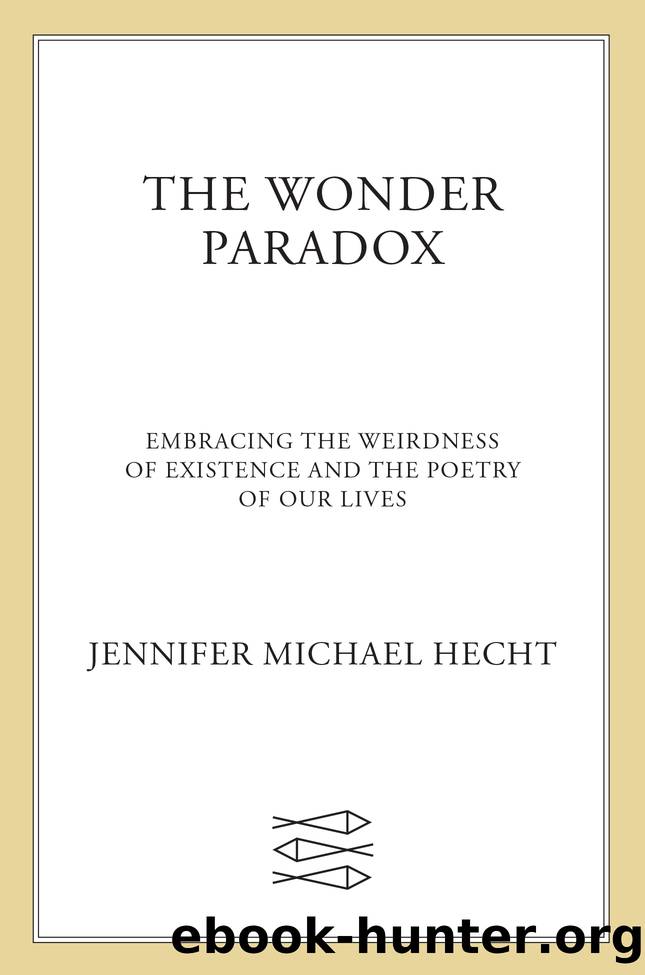The Wonder Paradox by Jennifer Michael Hecht

Author:Jennifer Michael Hecht
Language: eng
Format: epub
Publisher: Farrar, Straus and Giroux
The poem opens and closes with a heart inside a heart. With the lost Biblical image of unity in love, Adamâs rib becomes two hearts occupying one space. The words are at once caretaking (Iâm carrying you for your sake) and talismanic (Iâm carrying you for my sake). Love here is even deeper inside the body than ribs, in that tenacious thumping muscle they cage.
The interior of the poem is a brightly frenetic report on this cardiac fusion. To love is to know the world through the belovedâs eyes, even when apart. There is a feeling that we will be apart a lot. The degree of mutuality expressed in âwhatever is done / by only me is your doing, my darlingâ is nearly creepy. Fear is flagged in the tiny, set-off line âi fear.â A hint of fear in a wedding poem can be a safety valve against the pressure of scheduled joy.
The poemâs multiple parentheses feel like ever-greater confidences. There in the plant worldâs sexless striving, we find the hunger of human root and human bud. He says that love can reach past a jumble of physical and emotional limits but in calling this âthe deepest secretâ he acknowledges that optimism is not obvious from experience. How can we hope to exceed our own limits and loveâs renowned limitations? The âtree called lifeâ grows and carries us higher. The poemâs final, âi carry your heart(i carry it in my heart)â seals us up, like Adam, shy one rib and ready for love.
Cummings was inspired by the imagism of American poets Amy Lowell and Ezra Pound, a clean descriptive style animated in part by new contact with Chinese poetry. Also, after a trip to France, he was influenced by surrealism. For all that is new in his free use of language, the poem is essentially in the shape of a sonnet, and is Romantic about love and nature. The e. e. cummings and Guan Daosheng poems are images of marital unity that seem to promise that love survives anywayâdespite the realities of fears and separations, growth and recombination. These feelings arise together, true love is like true courage in that there is no real sense to the word unless you are scared; unless you are risking more than youâre holding. Consider poems that reference specifics about your wedding day. Donât worry about being too on the nose, if you get married in a barn, and you read a poem with a barn in it, it adds a sense of inevitability. Itâs memorable. If a poem you love has a bleak part that could feel incongruous with the day, hang a lantern on it: âWe love this poem because it contains joy and despair, light and darkness.â Some people trim off disturbing lines, but there is much to be said for letting the poem have a note that plays against the dayâs cotton-candy utopian dreams.
Download
This site does not store any files on its server. We only index and link to content provided by other sites. Please contact the content providers to delete copyright contents if any and email us, we'll remove relevant links or contents immediately.
4 3 2 1: A Novel by Paul Auster(12393)
The handmaid's tale by Margaret Atwood(7767)
Giovanni's Room by James Baldwin(7347)
Asking the Right Questions: A Guide to Critical Thinking by M. Neil Browne & Stuart M. Keeley(5776)
Big Magic: Creative Living Beyond Fear by Elizabeth Gilbert(5775)
Ego Is the Enemy by Ryan Holiday(5451)
The Body: A Guide for Occupants by Bill Bryson(5098)
On Writing A Memoir of the Craft by Stephen King(4945)
Ken Follett - World without end by Ken Follett(4735)
Adulting by Kelly Williams Brown(4576)
Bluets by Maggie Nelson(4559)
Eat That Frog! by Brian Tracy(4542)
Guilty Pleasures by Laurell K Hamilton(4450)
The Poetry of Pablo Neruda by Pablo Neruda(4110)
Alive: The Story of the Andes Survivors by Piers Paul Read(4033)
White Noise - A Novel by Don DeLillo(4012)
Fingerprints of the Gods by Graham Hancock(4005)
The Book of Joy by Dalai Lama(3987)
The Bookshop by Penelope Fitzgerald(3854)
